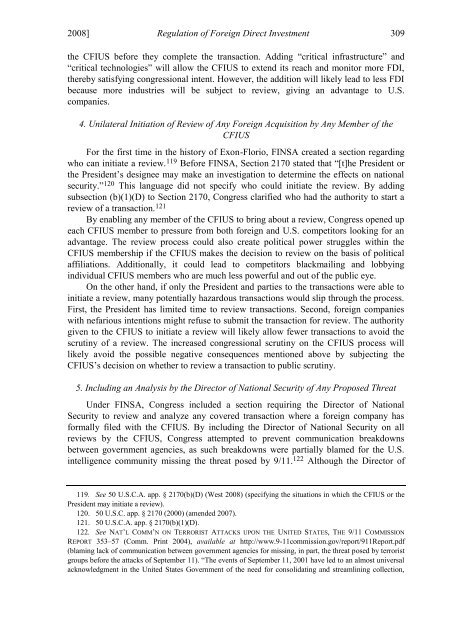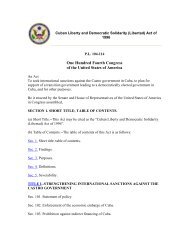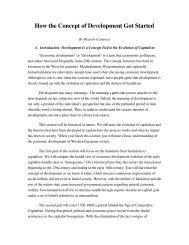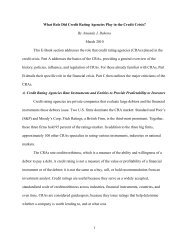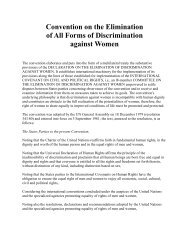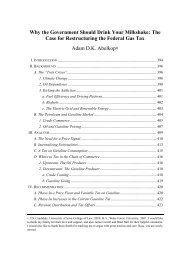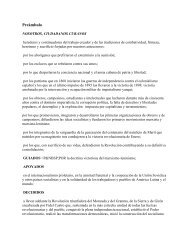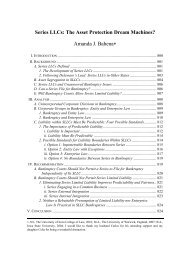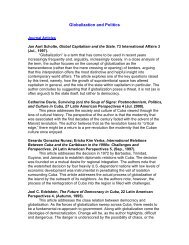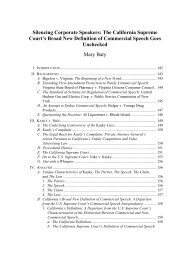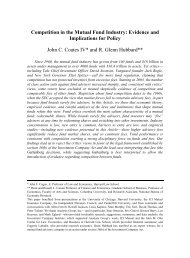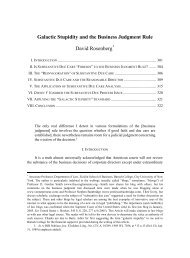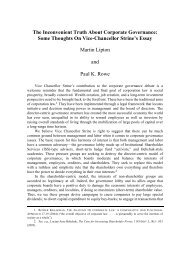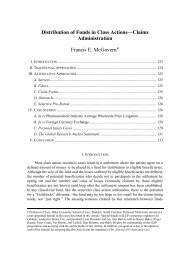Regulation of Foreign Direct Investment After the Dubai Ports ...
Regulation of Foreign Direct Investment After the Dubai Ports ...
Regulation of Foreign Direct Investment After the Dubai Ports ...
Create successful ePaper yourself
Turn your PDF publications into a flip-book with our unique Google optimized e-Paper software.
2008] <strong>Regulation</strong> <strong>of</strong> <strong>Foreign</strong> <strong>Direct</strong> <strong>Investment</strong> 309<br />
<strong>the</strong> CFIUS before <strong>the</strong>y complete <strong>the</strong> transaction. Adding ―critical infrastructure‖ and<br />
―critical technologies‖ will allow <strong>the</strong> CFIUS to extend its reach and monitor more FDI,<br />
<strong>the</strong>reby satisfying congressional intent. However, <strong>the</strong> addition will likely lead to less FDI<br />
because more industries will be subject to review, giving an advantage to U.S.<br />
companies.<br />
4. Unilateral Initiation <strong>of</strong> Review <strong>of</strong> Any <strong>Foreign</strong> Acquisition by Any Member <strong>of</strong> <strong>the</strong><br />
CFIUS<br />
For <strong>the</strong> first time in <strong>the</strong> history <strong>of</strong> Exon-Florio, FINSA created a section regarding<br />
who can initiate a review. 119 Before FINSA, Section 2170 stated that ―[t]he President or<br />
<strong>the</strong> President‘s designee may make an investigation to determine <strong>the</strong> effects on national<br />
security.‖ 120 This language did not specify who could initiate <strong>the</strong> review. By adding<br />
subsection (b)(1)(D) to Section 2170, Congress clarified who had <strong>the</strong> authority to start a<br />
review <strong>of</strong> a transaction. 121<br />
By enabling any member <strong>of</strong> <strong>the</strong> CFIUS to bring about a review, Congress opened up<br />
each CFIUS member to pressure from both foreign and U.S. competitors looking for an<br />
advantage. The review process could also create political power struggles within <strong>the</strong><br />
CFIUS membership if <strong>the</strong> CFIUS makes <strong>the</strong> decision to review on <strong>the</strong> basis <strong>of</strong> political<br />
affiliations. Additionally, it could lead to competitors blackmailing and lobbying<br />
individual CFIUS members who are much less powerful and out <strong>of</strong> <strong>the</strong> public eye.<br />
On <strong>the</strong> o<strong>the</strong>r hand, if only <strong>the</strong> President and parties to <strong>the</strong> transactions were able to<br />
initiate a review, many potentially hazardous transactions would slip through <strong>the</strong> process.<br />
First, <strong>the</strong> President has limited time to review transactions. Second, foreign companies<br />
with nefarious intentions might refuse to submit <strong>the</strong> transaction for review. The authority<br />
given to <strong>the</strong> CFIUS to initiate a review will likely allow fewer transactions to avoid <strong>the</strong><br />
scrutiny <strong>of</strong> a review. The increased congressional scrutiny on <strong>the</strong> CFIUS process will<br />
likely avoid <strong>the</strong> possible negative consequences mentioned above by subjecting <strong>the</strong><br />
CFIUS‘s decision on whe<strong>the</strong>r to review a transaction to public scrutiny.<br />
5. Including an Analysis by <strong>the</strong> <strong>Direct</strong>or <strong>of</strong> National Security <strong>of</strong> Any Proposed Threat<br />
Under FINSA, Congress included a section requiring <strong>the</strong> <strong>Direct</strong>or <strong>of</strong> National<br />
Security to review and analyze any covered transaction where a foreign company has<br />
formally filed with <strong>the</strong> CFIUS. By including <strong>the</strong> <strong>Direct</strong>or <strong>of</strong> National Security on all<br />
reviews by <strong>the</strong> CFIUS, Congress attempted to prevent communication breakdowns<br />
between government agencies, as such breakdowns were partially blamed for <strong>the</strong> U.S.<br />
intelligence community missing <strong>the</strong> threat posed by 9/11. 122 Although <strong>the</strong> <strong>Direct</strong>or <strong>of</strong><br />
119. See 50 U.S.C.A. app. § 2170(b)(D) (West 2008) (specifying <strong>the</strong> situations in which <strong>the</strong> CFIUS or <strong>the</strong><br />
President may initiate a review).<br />
120. 50 U.S.C. app. § 2170 (2000) (amended 2007).<br />
121. 50 U.S.C.A. app. § 2170(b)(1)(D).<br />
122. See NAT‘L COMM‘N ON TERRORIST ATTACKS UPON THE UNITED STATES, THE 9/11 COMMISSION<br />
REPORT 353–57 (Comm. Print 2004), available at http://www.9-11commission.gov/report/911Report.pdf<br />
(blaming lack <strong>of</strong> communication between government agencies for missing, in part, <strong>the</strong> threat posed by terrorist<br />
groups before <strong>the</strong> attacks <strong>of</strong> September 11). ―The events <strong>of</strong> September 11, 2001 have led to an almost universal<br />
acknowledgment in <strong>the</strong> United States Government <strong>of</strong> <strong>the</strong> need for consolidating and streamlining collection,


